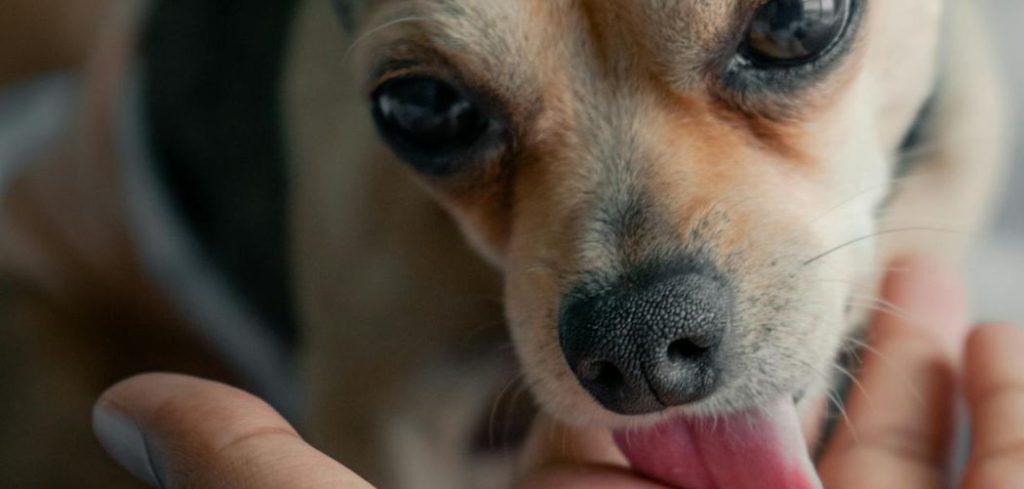It can feel cute at first when a dog constantly licks, but when it becomes excessive, it often leaves owners confused or even concerned.
Licking can be a sign of affection, but it may also point to anxiety, medical issues, or other underlying problems.
We outline the common reasons why dogs may constantly lick their owners, what you can do at home, and when to seek veterinary help.
Table of Contents
Dog Constantly Licking Me — Why It Happens
Dogs lick people for a variety of reasons, ranging from natural bonding behaviors to medical or emotional concerns. Some lick because it is their way of showing affection, while others may do it out of boredom, stress, or anxiety.
In certain cases, licking may be tied to skin allergies, nausea, or underlying health issues. For some dogs, the behavior becomes compulsive and difficult to stop.
While licking is usually harmless, constant licking can be uncomfortable and may suggest that something more serious is going on.

Dog Constantly Licking Me: Common Causes
Affection and Bonding
Dogs often lick their owners as a sign of love and social bonding. Licking releases endorphins that make dogs feel calm and happy.
Owners may notice this most after returning home, during cuddle time, or when giving attention.
While affectionate licking is normal, constant licking that interferes with daily life can become frustrating.
Read more: Dog Constantly Shaking Head (Is it just irritation or something serious?)
Anxiety or Stress
When dogs feel anxious, they may engage in repetitive behaviors like licking as a way to self-soothe.
This may happen when they are left alone, hear loud noises, or encounter changes in routine. A dog that constantly licks its owner could be trying to find comfort in their presence.
If stress is the root cause, owners may also notice pacing, whining, or restlessness.
Attention-Seeking Behavior
Some dogs quickly learn that licking grabs their owner’s attention. Even if the response is negative, the dog still succeeds in getting interaction.
Over time, this reinforces the behavior, leading to excessive licking. Dogs that lack enough mental stimulation or physical exercise are especially prone to this kind of attention-seeking.
Medical Issues (Nausea, Allergies, or Pain)
Dogs experiencing nausea sometimes lick excessively as a way to cope with the sensation.
Similarly, dogs with skin allergies or irritations may lick their owners in addition to licking themselves. In rare cases, pain or neurological conditions can trigger unusual licking behaviors.
If constant licking appears suddenly and is paired with other signs like drooling, vomiting, or scratching, a vet visit is recommended.
Compulsive Behavior
In some dogs, licking develops into a compulsive disorder. This means the behavior is performed excessively and without clear purpose.
Dogs with compulsive licking may do it for long periods, making it hard to distract or redirect them.
This usually stems from anxiety, boredom, or an underlying medical condition. Without intervention, compulsive licking can worsen over time.
Taste and Smell
Sometimes the simplest reason is that dogs are drawn to the taste of skin, sweat, or lotions. Human skin carries natural salts, and dogs may find it appealing.
If lotions, creams, or perfumes are applied, dogs may lick to explore or enjoy the scent. While this is generally harmless, it can become excessive if encouraged.
What to Do If Your Dog Is Constantly Licking You
If a dog is licking for affection or bonding, the behavior can be managed with training and redirection.
Gently move the dog’s attention to a toy or activity instead of reinforcing the licking. Increasing daily exercise and mental stimulation often reduces licking caused by boredom or attention-seeking.
For anxious dogs, providing a structured routine, calming toys, or safe spaces can help reduce the urge to lick.
Some owners find success with interactive feeders or puzzle toys that keep the dog mentally engaged. Training commands like “leave it” or “no lick” can also help set boundaries.
If medical issues are suspected, such as nausea, allergies, or sudden behavioral changes, a veterinarian should evaluate the dog.
Owners should avoid punishing the licking, as this may increase anxiety and make the behavior worse. Instead, focus on calm redirection and positive reinforcement.
When to Call or Visit Your Vet
A vet visit is necessary if licking becomes sudden, intense, or is accompanied by other symptoms. Warning signs include drooling, vomiting, loss of appetite, constant scratching, or changes in behavior. These could indicate underlying health issues that need immediate attention.
If the licking is compulsive and difficult to interrupt, professional guidance is important.
A veterinarian may recommend behavior modification strategies, anti-anxiety treatments, or ruling out medical conditions. Any sudden change in licking patterns, especially in older dogs, should be taken seriously.
Read more: Dog Constantly Whining (Signs of distress you shouldn’t ignore)
Key Takeaway
A dog constantly licking its owner can be a sign of love, but it may also signal anxiety, medical problems, or compulsive behaviors.
While occasional licking is normal, persistent licking deserves attention. Redirecting the behavior, increasing stimulation, and addressing potential health issues can make a big difference.
If in doubt, seeking veterinary advice ensures both comfort and peace of mind for the dog and owner.
